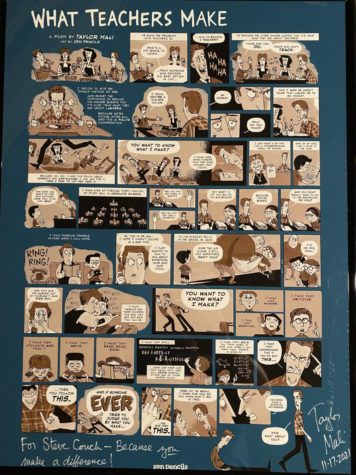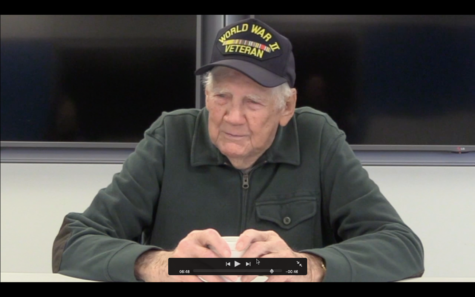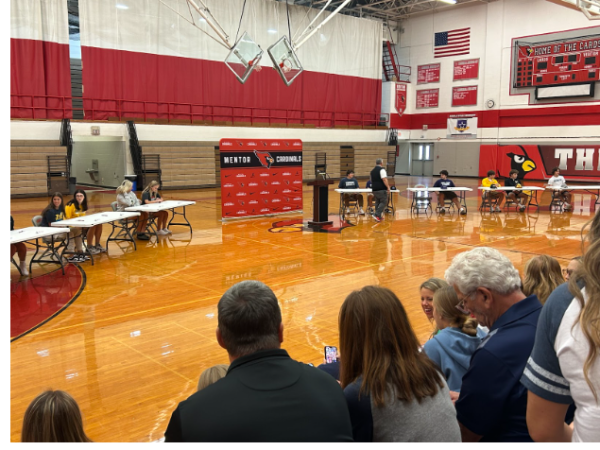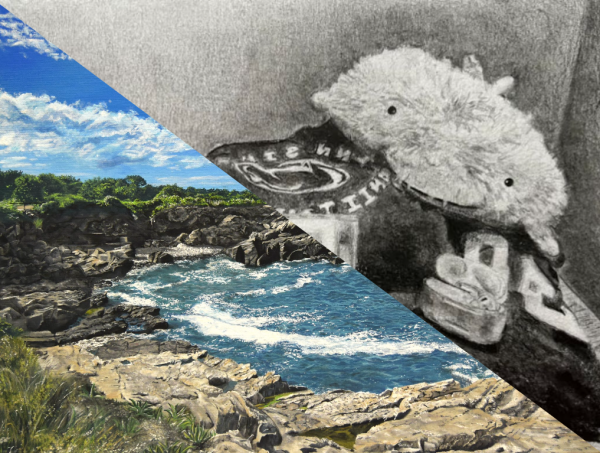International “slam poet” reaches out to Mentor students
Award-winning and viral slam poet Taylor Mali had a Zoom call with Cardinal Nation staffers in December. Hear his message for Mentor students.

March 27, 2022
Taylor Mali is a well-known “slam poet” from New York. He spent nine years teaching history, math, and English while also assisting with SAT preparation. In December, Mali met with the staff of Cardinal Nation over Zoom. He spoke about the importance of having a voice and how to find it. Mr. Couch, who is the advisor of Cardinal Nation, was the one who set up the meeting. This is the story on how he came to know Mr. Mali and share him with his new staff.
“Back in November,” as Mr. Couch tells it, “I had one of those days that every teacher has when you think you’re no good and you’ve done a crummy job on something. The past couple of years have been pretty rough on teachers, and I made a post about it on Facebook that day. I’m not usually one to get down about my job, so it got a lot of attention from the friends and family that I know that are also teachers or in education. I guess if Steve Couch was bummed about being a teacher, who wouldn’t be? That’s the impression I got from the response, anyway. Well, my wife’s cousin who is also an author and acquaintance of slam poet Taylor Mali reached out to him to say that he had a teacher (me) who was feeling down about his job and needed a pick-me-up. Mr. Mali has a poem called ‘What Teachers Make’ that has gone viral in educator circles, and education is often one of his themes. Well, Mr. Mali not only reached out, he sent me a personally autographed poster of his poem now hanging in my basement, and on the back included his personal e-mail and phone number. I reached out to him with gratitude, and he offered to meet with my students. That is how this guy who travels internationally as a paid guest speaker in order to make a living spent over an hour with the Cardinal Nation staff last December to discuss the important of finding one’s own voice.

That is one of the missions of Cardinal Nation, so to say that this Zoom call was a giant privilege is a total understatement. And it did make me feel much better! ”
Mali’s slam poetry is a form of performance poetry that combines the elements of performance, writing, competition, and audience participation. For those into acting and writing, slam poetry is the perfect activity for you. “Slam” in the name comes from the fact that people have the ability to have a high energy performance.
The focus of the interview with Taylor Mali was to try help teens gain their voice. He discusses advice on how to find it along with how he found his.
Cardinal Nation: Where has your work taken you?
Mali: I’ve been all over the world in the last 22 years teaching poetry. But never to Australia or New Zealand!
Cardinal Nation: How did you manage to make poetry a career?
Mali: It’s quite amazing that I get to do this. I think the only reason I ended up here is that here was not where I was aiming to end up. I could still be quite happy teaching.
Cardinal Nation: What are some great accomplishments you want to highlight?
Mali: I convinced 1,000 people to become teachers. It took me 12 years, and I have no idea if they actually did what they said they were going to do. But it gave me a “project.” Also, I finally became a dad!
Cardinal Nation: How did you get into poetry and education?
Mali: My dad used to recite rhyming poems at family weddings & birthday parties, and it was always an event people loved. So I learned from the get-go that poetry can be a performance and a way to commemorate a special event. I got into poetry to be like my Dad. Education is a different story. I fell into it while learning to be a better poet in graduate school. But in a way, being a poet and being a teacher are exactly the same job: we are the midwives of epiphany, the coaches who bring you to new understanding.
Cardinal Nation: What challenges have you faced throughout your life?
Mali: Meh. Not that many, really. I know the stereotypical idea of a poet is someone who has spun gold out of their traumatic childhood, but that’s not me. In fact, like a lot of happy kids, I used to actually WISH that bad things would happen to me just so I’d have something good to write about! How dumb is that?
Cardinal Nation: How did you find your voice?
Mali: By trying on many voices until I found the one that fits best. And I’m still refining it. I know that I tend to over rely on humor in my poetry sometimes, but every time I try to pull it back a little bit I end up sounding stuffy and obnoxious. I am always searching. Always trying new things.
Cardinal Nation: What advice would you give teenagers to help find their voice?
Mali: Don’t be afraid of revision! Beginning writers think writing is so hard that they are looking for every opportunity to just be done with it. The idea of “taking another pass” at a piece of writing is just . . . “Why would I do that?! It’s done already!” I learned a lot about writing in 11th grade when I accidentally finished an essay on Thursday when the teacher actually wasn’t expecting it until Friday. Every fiber of my teenage mind was thinking “Woot! No homework tonight in this class because my paper is already done!” But something made me sit down to see if I could make it any better. And it became a LOT better! In fact, I became disgusted with the person I had almost let myself be!
Cardinal Nation: How have you worked with schools to help their students find their voice?
Mali: That’s not really my mission statement. I know that’s why I was brought to your class. But I’m really just a poet. What works for me, however, is to tell students that you get the best poems sometimes when you give yourself the permission to write about the things that you didn’t think you would ever tell anyone. Billy Collins told me that.
Cardinal Nation: When you see schools that allow strong student voice versus those that don’t, what do you see as the differences in student experiences and school cultures for each?
Mali: Schools where students are allowed to express their opinions are not, in general, AFRAID of what the students might say. The more you clamp down on student voice, the more afraid you become of the voices that manage to escape.
If you would like to read more about Taylor Mali and check out his website, https://taylormali.com/.











